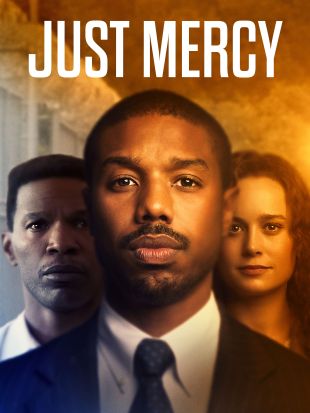
In the long lineage of biopics concerning American injustice, Just Mercy is notches above 42 but leagues below Malcolm X. Still, the Destin Daniel Cretton-directed film-which is based on a true story-is relevant and worthwhile.
Walter McMillian's (Jamie Foxx) experience on death row as an innocent man is a dreadful account, but one made heroic by the vigorous efforts of attorney Bryan Stevenson (Michael B. Jordan), a recent Harvard Law School graduate. Stevenson's arrival in 1989 Alabama and subsequent fight for McMillan's life are met with ego and bigotry. As he tracks down witnesses and corroborates testimony, he sees that injustice still exists in the South.

The persistent pace of Just Mercy makes the enormity of systemic racial injustice seem under tight rein. It's as though the filmmakers channeled the broad scope of director Ava DuVernay's 13th into an alive and personal true story.
Foxx proves once again that he's an underrated dramatic actor. Even in his limited, enclosed scenes at the prison and in the courtroom, the caged insanity reverberates even in the quieter moments of suffering.
Jordan as the real-life lawyer isn't very trailblazing. As the stock hero type, he jogs through his frustrations and we see the single tear drop down his cheek, but mostly he's consigned to routine speeches. Tim Blake Nelson as Ralph Myers, the prosecution's key witness against McMillian, steals a few scenes with his twitchy, anxious demeanor.
The racial injustice faced by McMillian echoes throughout American history, and the film isn't afraid to emphasize it. An early scene shows Stevenson driving up to the prison as black inmates are doing manual labor while a white guard with a shotgun towers over them on a horse. Far from a Rick Grimes stand-in, the image evokes slavery-era plantation power dynamics: the field hands and the white masters. Just Mercy is scathing in its indictment that the treatment of black Americans has not changed one bit.
Stevenson, safe in his knowledge of the law and his rights, is still subjected to racist indignity, such as being strip searched at the prison and facing a stop-and-search at gunpoint. The chilling relevance is undoubtable when the sheriff coolly says, "Hey brother, you better be careful with your words if you got a gun at your head."
The struggle for equality is front and center. But everything hinges on several moments where white characters need to do the right thing, which indicates the story might be more about our reliance as a society on the passing goodness of white people. The film lacks clarity in this endeavor, however. The scene of the guard being portrayed as the "good guy" to McMillian-even though he's the one who subjected Stevenson to the humiliating strip search-is nauseating to watch. It demonstrates an odd persistence to make terrible white people seem as though they still have integrity.

The film navigates these treacherous socio-political waters, while also attempting to engage the audience in the tortuous journey to justice. Beyond the superior acting, Just Mercy doesn't attempt to thrill the audience much with sets, lighting, or even with costuming-without Brie Larson's high-waisted pants and perm, one would hardly know it's set in the early 1990s. However, songs like "Don't Wanna Fight" by Alabama Shakes and "Trouble of the World" by the iconic Mahalia Jackson punctuate emotional scenes impeccably. The song playing over the loudspeaker during a condemned man's execution day is a specific soul punch.
Just Mercy is one of those stories that needed to be told, and through a modern perspective, the gritty nuances are there. The film doesn't quite soar, but it sits on a sturdy foundation.
